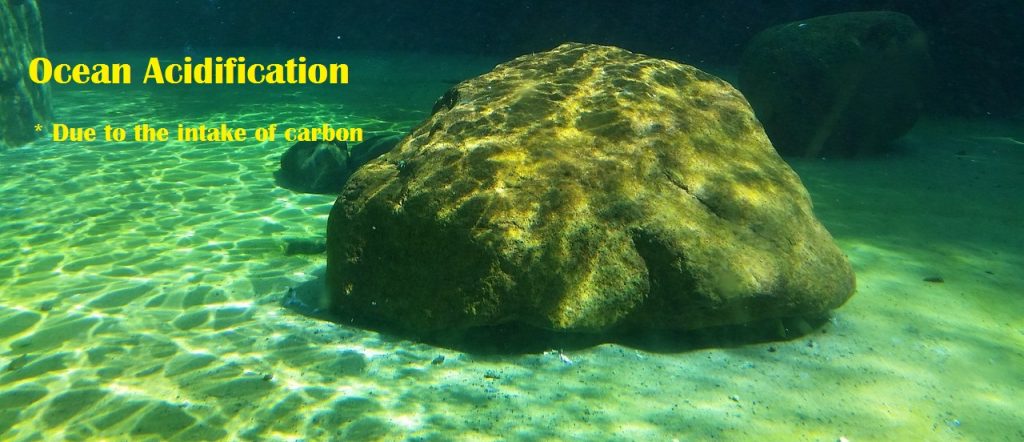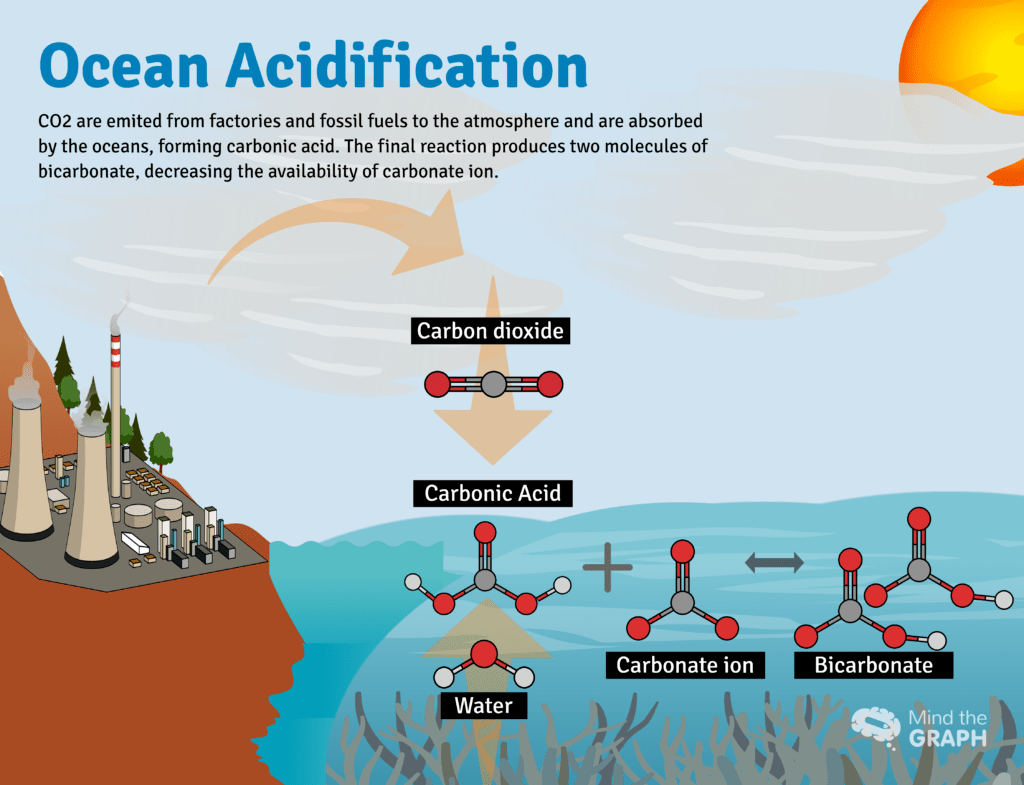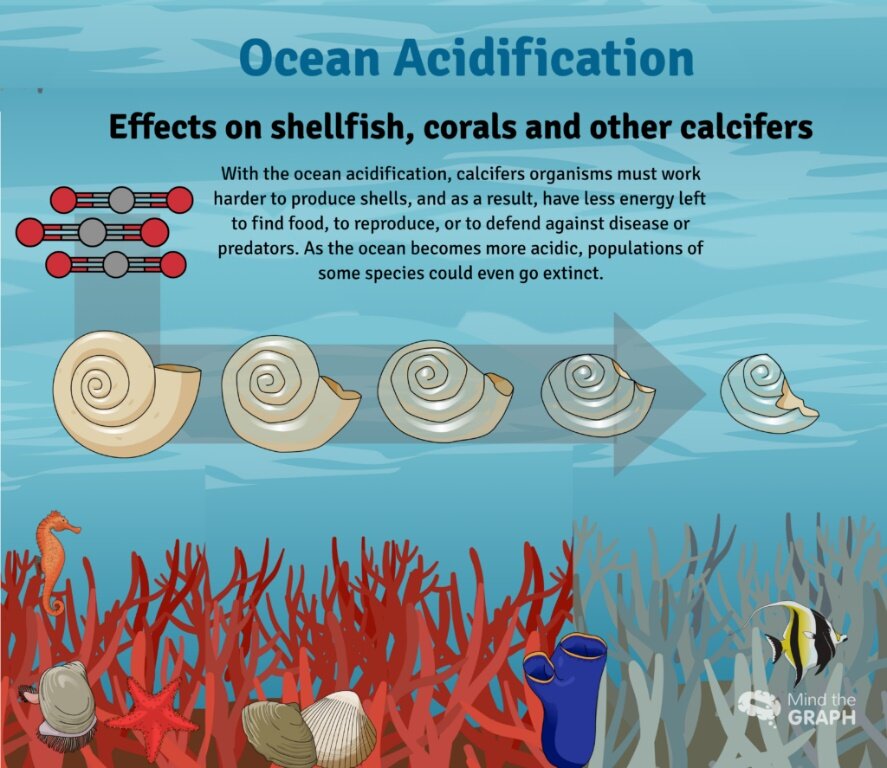Description

Disclaimer: Copyright infringement not intended.
Context
- The increase in atmospheric carbon dioxide has caused the world’s oceans to turn more acidic.
- Recently, it has been observed that by 2100, even the Great Lakes — Superior, Michigan, Huron, Erie, and Ontario — might approach acidity at around the same rate as the oceans.
Acidification of Water Bodies
- Ocean acidification is the process in which seawater becomes more acidic because of the excess carbon dioxide (CO2) it is absorbing from the atmosphere.
- When carbon dioxide dissolves into the ocean, it triggers a chemical reaction that increases acidity over time. More technically: CO2 and water produce carbonic acid, which releases hydrogen and bicarbonate ions. The more hydrogen ions there are, the more acidic the water becomes. This is what drives ocean acidification.
- This phenomenon, which is impacting every ocean on Earth (as well as coastal estuaries and other waterways), is a direct consequence of the burning of fossil fuels and the resulting carbon pollution.

- Scientists initially believed this might be a good thing, as it leaves less carbon dioxide in the atmosphere. But in the past decade or so, it has been established that absorption of carbon dioxide leads to a lowering of the pH, which makes the water bodies more acidic.
- According to the National Oceanic and Atmospheric Administration (NOAA) of the US government, oceans have 200 years alone, ocean water has become 30 percent more acidic.
.jpg)
- What Causes Ocean Acidification?
- Disposal of waste in the oceans: Not only domestic and industrial waste contributes to ocean acidification, but sewage disposal and agricultural waste disposal also contribute to increasing the acidity of the ocean water.
- The growing rate of industrialization: Various industries are running across the world, release different harmful gases in the atmosphere, such as carbon dioxide, nitrogen oxide, sulfur dioxide, etc. Later on, these gases get entry into ocean water in the form of acid rain increasing the acidity of ocean water.
- The growing rate of deforestation- Deforestation is a well know environmental issue in the world for various reasons such as the increase of pollution, loss of biodiversity, loss of natural habitats, etc. Apart from all this, deforestation is also responsible for carbon dioxide emissions.
- Poor land management- Chemicals present in these fertilizers and pesticides get an entry into the ocean with rainwater and soil erosion. When these chemicals dissolve in ocean water reduces the quality of water by acidifying it.
- Manufacturing of cement- Cement manufacturing releases a huge amount of carbon dioxide in the atmosphere. This carbon dioxide finds its way to enter into ocean water in the form of acid rain.
- Combustion of Fossil Fuels: Burning fossil fuels such as coal, petroleum, etc. release a large amount of carbon dioxide in the atmosphere. This carbon dioxide gets entry into oceanic water through acidic rain or sometimes through direct modes.
Impact of Ocean Acidification
Decreasing the quality of oceanic water
Affecting the marine life:
- As the concentration of hydrogen ions increases, the water becomes more acidic. Besides that, the carbonate ions become less abundant.
- Some of the extra hydrogen ions react with carbonate ions to form more bicarbonate. As carbonate becomes less abundant, these organisms, such as corals and clams, have more difficulty building and maintaining their shells and skeletons. Increased acidity can even cause some carbonate shells and skeletons to dissolve.
- Hydrogen ions react with the solid calcium carbonate and convert it to soluble bicarbonate and calcium ions.

Affecting the coral reefs:
- Carbonate is the main requirement of corals to make their internal structure, but ocean acidification is causing the reduction of carbonate ions in the water.
Affecting the vegetation of the marine ecosystem:
- Ocean Acidification affects the photosynthesis process of the plankton and other vegetation underwater.
Behavioral changes of water animals:
- Some recent studieshave shown that ocean acidification is generating some changes in the actual behavior of marine animals.
- The lower pH level due to ocean acidification also decreases the sense of smell in fishes that make it tougher to guess the risk coming close to them.
Effects on the shellfish:
- The Economic and ecological importance of shellfishes is huge. Shellfishes are one of the important creatures of the marine life ecosystem. These animals, such as mussels, oysters, etc. need proper pH balance and carbonate ions to build their outer protective shell.
- The acidity of the ocean water is increasing day by day, causing severe damages in the chemistry of the water. Due to which the shellfishes are facing problems in maintaining their existence.
Food sources are declining
- Fish is one of the primary sources of protein for many people around the world. Still, due to ocean acidification, the population of fish and other seafood animals is declining day by day.
Way Ahead
- Pollution regulations for power plants and stronger fuel-economy standards.
- Government leaders can also step up conservation efforts to protect and enhance the resilience of our forests, wetlands, and other critical carbon sinks, through initiatives like the 30x30 pledge, which sets aside 30 percent of our lands and waters to let ecosystems recover and withstand these growing challenges.
- Climate action plans that promote increased investments in monitoring, forecasting, and mitigation.
- Cultivating ocean acidification–resistant strains of shellfish and diversifying aquaculture systems. For example, scientists are teaming up with fishermento see how cultivating seaweeds like sugar kelp can potentially buffer farmed oysters, clams, and mussels from acidification as they absorb carbon dioxide from the salty water.
Bottomline
- The most effective way to limit ocean acidification is to act on climate change, implementing solutions to dramatically reduce the use of fossil fuels.
- If we dramatically cut our global warming emissions, and we limit future warming, we can significantly reduce the harm to marine ecosystems.
.jpg)
https://indianexpress.com/article/explained/explained-climate/us-canada-great-lakes-turning-acidic-study-explained-8337311/#:~:text=Acidification%20of%20water%20bodies,carbon%20dioxide%20in%20the%20atmosphere.















